Blog
November 26th, 2019 by BaerbelBDU conference certificate of attendance 2019
March 1st, 2019 by BaerbelFlowers from a happy customer
December 15th, 2017 by Baerbel
A little Christmassy »Thank you« to my customers
October 9th, 2017 by BaerbelGastrointestinal donor bank for men/women?
A great example of what can go wrong if clients decide to add text to already translated German copy … it just takes a couple of misplaced letters to turn a bracelet for men/women into a donor bank for male/female guts.
July 3rd, 2017 by Baerbel July 3rd, 2017 by BaerbelWhat a beautiful and beautifully written endorsement of my native language! Thank you, John le Carré!
The Guardian, 2 July 2017
Why we should learn German
by John le Carré
“I began learning German at the age of 13, and I’m still trying to explain to myself why it was love at first sound. The answer must surely be: the excellence of my teacher. At an English public school not famed for its cultural generosity, Mr King was that rare thing: a kindly and intelligent man who, in the thick of the second world war, determinedly loved the Germany that he knew was still there somewhere.
Rather than join the chorus of anti-German propaganda, he preferred, doggedly, to inspire his little class with the beauty of the language, and of its literature and culture. One day, he used to say, the real Germany will come back. And he was right. Because now it has.
Why was it love at first sound for me? Well, in those days not many language teachers played gramophone records to their class, but Mr King did. They were old and very precious to him and us, and he kept them in brown paper bags in a satchel that he put in his bicycle basket when he rode to school.
What did they contain, these precious records? The voices of classical German actors, reading romantic German poetry. The records were a bit cracked, but that was part of their beauty. In my memory, they remain cracked to this day:
Du bist wie eine Blume – CRACK – So hold und schön und… – CRACK (Heinrich Heine)
Bei Nacht im Dorf der Wächter rief… – CRACK (Eduard Mörike’s Elfenlied)
And I loved them. I learned to imitate, then recite them, crack and all. And I discovered that the language fitted me. It fitted my tongue. It pleased my Nordic ear.
I also loved the idea that these poems and this language that I was learning were mine and no one else’s, because German wasn’t a popular subject and very few of my schoolmates knew a word of it beyond the Achtung! and Hände hoch! that they learned from propaganda war movies.
Advertisement
But thanks to Mr King, I knew better. And when I decided I couldn’t stand my English public school for one more day, it was the German language that provided me with my bolt-hole. The year was 1948. I couldn’t go to Germany, so I went to Switzerland and at 16 enrolled myself at Bern university.
And in Switzerland, instead of Mr King, I had another admirable teacher in Frau Karsten, a stern north German lady with grey hair in a ponytail, and she, like Mr King, rode a bicycle, sitting very upright with her grey hair bobbing along behind her.
So it’s no wonder that when later I went into the army for my national service, I was posted to Austria. Or that after the army I went on to study German at Oxford. And so to Eton, to teach it.
You can have a lot of fun with the German language, as we all know. You can tease it, play with it, send it up. You can invent huge words of your own – but real words all the same, just for the hell of it. Google gave me Donaudampfschiffsfahrtsgessellschaftskapitän.
You’ve probably heard the Mark Twain gag: “Some German words are so long they have a perspective.” You can make up crazy adjectives like “my-recently-by-my-parents-thrown- out-of- the-window PlayStation”. And when you’re tired of floundering with nouns and participles strung together in a compound, you can turn for relief to the pristine poems of a Hölderlin, or a Goethe, or a Heine, and remind yourself that the German language can attain heights of simplicity and beauty that make it, for many of us, a language of the gods.
And for all its pretending, the German language loves the simple power of monosyllables.
The decision to learn a foreign language is to me an act of friendship. It is indeed a holding out of the hand. It’s not just a route to negotiation. It’s also to get to know you better, to draw closer to you and your culture, your social manners and your way of thinking. And the decision to teach a foreign language is an act of commitment, generosity and mediation.
It’s a promise to educate – yes – and to equip. But also to awaken; to kindle a flame that you hope will never go out; to guide your pupils towards insights, ideas and revelations that they would never have arrived at without your dedication, patience and skill.
To quote Charlemagne: “To have another language is to possess a second soul.” He might have added that to teach another language is to implant a second soul.
Of course, the very business of reconciling these two souls at any serious level requires considerable mental agility. It compels us to be precise, to confront meaning, to think rationally and creatively and never to be satisfied until we’ve hit the equivalent word, or – which also happens – until we’ve recognised that there isn’t one, so hunt for a phrase or circumlocution that does the job.
No wonder then that the most conscientious editors of my novels are not those for whom English is their first language, but the foreign translators who bring their relentless eye to the tautological phrase or factual inaccuracy – of which there are far too many. My German translator is particularly infuriating.
In the extraordinary period we are living through – may it be short-lived – it’s impossible not to marvel at every contradictory or unintelligible utterance issuing from across the Atlantic. And in marvelling, we come face-to-face with the uses and abuses of language itself.
Clear language – lucid, rational language – to a man at war with both truth and reason, is an existential threat. Clear language to such a man is a direct assault on his obfuscations, contradictions and lies. To him, it is the voice of the enemy. To him, it is fake news. Because he knows, if only intuitively, what we know to our cost: that without clear language, there is no standard of truth.
And that’s what language means to a linguist. Those who teach language, those who cherish its accuracy and meaning and beauty, are the custodians of truth in a dangerous age.
And if they teach German – and teach it in this my beleaguered country – they are quite particularly to be prized, all the more so because they are an endangered species. Every time I hear a British politician utter the fatal words, “Let me be very clear”, these days I reach for my revolver.
By teaching German, by spreading understanding of German culture and life, today’s honorands and their colleagues will be helping to balance the European argument, to make it decent, to keep it civilised.
They will be speaking above all to this country’s most precious asset: its enlightened young, who – Brexit or no Brexit – see Europe as their natural home, Germany as their natural partner, and shared language as their natural bond.”
February 23rd, 2017 by BaerbelA united front on the future of foreign nationals
Published on Wednesday, 22 February 2017 11:24
The following press release was distributed to the media by ATC and ITI before the first House of Lords Debate on Brexit (20 February).
Ahead of the first House of Lords debate on the Brexit Bill (20 February), two of the UK’s leading professional language organisations are making a direct plea to Theresa May to put an immediate end to the uncertain status of 3.3 million EU citizens living and working in the UK.
The UK’s language industry is heavily dependent on mother-tongue linguists, many of whom are EU nationals living and working in the UK.
The Association of Translation Companies (ATC) and the Institute of Translation & Interpreting (ITI) are concerned that the Prime Minister is simply paying lip service to the future of EU nationals who will continue to be used as bargaining chips in negotiations with European Union member states.
While comments made during a Commons debate on the Brexit Bill indicated Mrs May’s recognition for the valuable contribution EU citizens make to UK society and economy, her whips ensured that an amendment to the Bill, which would have safeguarded the position of EU citizens was defeated by 42 votes. That vote demonstrated her resolve not to take any unilateral action to guarantee EC citizens’ status, ahead of the Article 50 negotiations.
Geoffrey Bowden, General Secretary for the ATC comments: “Ours is a sector heavily reliant on mother-tongue linguists for translation and interpreting. Many thousands of those EU professionals are resident in the UK and it is both immoral and destabilising for the industry to prolong the uncertainty about their status any further.”
Currently around one third of public service interpreters and 85% of modern foreign language assistants in UK schools are EU nationals, with many EU linguists also having established language service companies, which make a positive contribution to the UK’s £1 billion language industry.
Geoffrey continues: “We would urge the Prime Minister to take urgent action, in line with recommendations from the All-Party Parliamentary Group on Modern Languages, to guarantee the residency status for EU nationals already living in the UK and safeguard the future recruitment of EU citizens.
“The government talks about ensuring UK prosperity within a post-Brexit global economy and having access to a pool of professional linguists based in the UK, regardless of their nationality, is going to be key in realising that objective.”
Language services professionals, with their knowledge of languages and culture, are ideally placed to help the UK successfully overcome the challenges of Brexit and Sarah Griffin-Mason, Chair of the ITI, strongly believes the valuable role they have to play should be recognised at the highest level: “The expertise of UK-based, professional EU linguists will be essential when it comes to British companies negotiating trade deals and business agreements with Europe and the rest of the world post-Brexit.”
Geoffrey concludes: “Whilst Theresa May has insisted that she will be able to get an ‘early agreement’ on the rights of EU citizens living in the UK, we worry that this was just an attempt to ease the concerns of rebel Tory MPs. What we really need from our Prime Minister is decisive action and we implore her not to continue using EU citizens as pawns in a clearly flawed and immoral Brexit strategy.”
September 9th, 2016 by Baerbel
Hole Milk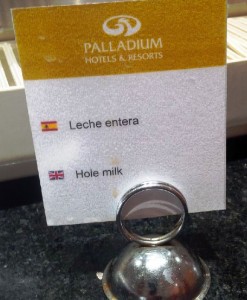
On the hole, I confess to being rather partial to hole milk on my cereal in the morning as well as in the gallons of tea that sustain me through the day. I’ve never bothered with the tasteless semi-skimmed or ‘why even bother’ skimmed varietals on offer preferring to holeheartedly embrace all things the way nature intended them to be … holesome.
So when I came across this local delicacy on wholiday recently I could not help but wonder how it should be drunk – or even if it was wise to be drinking it at all!
May 7th, 2016 by Baerbel
Hands-on medical technology: Visceral surgery
BDU seminar in Speyer
23-24.04.2016
Having been to a previous excellent medical seminar organised by Julia Berghaus on behalf of the BDÜ Rheinland-Pfalz two years ago (Medical technology – orthopaedic surgery: instruments, implants and their applications) and having unfortunately missed the boat last year (Cardiology at your fingertips), I was determined and fortunate to make it to this year’s event (Hands-on medical technology: Visceral surgery).
Dr Dirk Jentschura, senior consultant for visceral and vascular surgery at the Diakonissen-Stiftungs-Krankenhaus Speyer, welcomed us – 20 translators and interpreters from all over Germany, France, Spain and the UK – to what became a highly interesting, informative and intense two days. Our weekend whistle-stop tour covered a whole range of topics from the anatomy of the abdominal wall and suturing techniques to hernias and hernia treatment and management and from the anatomy and pathology of colorectal diseases and different techniques in surgery all the way to laparoscopic and open intestinal and rectal surgery including gall bladder and appendicitis. Dr Jentschura described visceral surgery as “alles, was weich und schlabberig ist” – everything soft and wobbly.
Dr Jentschura’s colleague, consultant Dr Helena Lochner, went on to explain open procedures versus laparoscopic (minimally invasive/keyhole) procedures which are the preferred method at the hospital in Speyer. To demonstrate and for us to try out a range of wound suturing and stapling techniques we were given a couple of raw chicken legs whose skin had already been cut to simulate a surgical wound. Even the most nimble-fingered among us agreed that it was easier said than done and that any needlework classes at school were of limited use. Still, an immensely enjoyable, satisfying experience!
After a well-deserved coffee break Dr Lochner handed over to her colleague, leading consultant Dr Willibald Renner, “leidender Oberarzt” as he calls himself, a play on words between “leitend” (leading) and “leidend” (suffering) before moving on to explain the different types of hernia, what causes them and how and when to treat them. His talk was supported by shockingly graphic photographs of patients with untreated hernias I would not have believed possible – including one case which went untreated for decades and ultimately reached to the patient’s knees.
Following lunch in the hospital’s canteen which we shared with what felt like half of Speyer’s children dressed up in surgeon’s scrub for a family open day we scrubbed up for our guided tour through the operating theatre where Dr Jentschura showed us the principles of keyhole surgery and letting us put our 3D awareness and steady hands to the test with a practice kit connected to the monitor. Using laparoscopic instruments such as the LigaSureTM vessel sealing device we were asked to pick up jelly babies scattered about and put them in a pepper. Easier said than done!
Particularly fascinating to me was the innovative laparoscopic microwave ablation of liver tumours, which is essentially a probe inserted into the liver which accurately and relatively sparingly destroys individual tumours. The liver Dr Jentschura demonstrated this new technique on had belonged to a pig.
Later on that afternoon Richard Becker introduced us to the toolbox – various gadgets and gizmos that doctors new to laparoscopic procedures can use to improve and practice their surgery techniques on again by focussing on the monitor and not on their hands. We eventually got the hang of putting colour-coded plastic rings into their respective containers, but we were a long way off being accomplished keyhole surgeons! Still, it was fun experimenting and getting an idea of how it is done.
Sunday morning started with Dr Jentschura introducing us to colorectal diseases, anatomy, pathology and the principles of surgical procedures – of particular interest to me due to my own family history and having had two colonoscopies in the past. Seeing how physically close the liver is to the large intestines made me realise how easily colorectal tumours can infiltrate into neighbouring organs such as the liver and how vital it is for patients with a family history to have a colonoscopy to detect and resect any potentially cancerous polyps at an early stage.
Consultant Mathis Fußer took us through the open and laparoscopic intestinal and rectal surgical resection procedures and his colleague Dr Wilfried Müller through gall bladder diseases and appendicitis and their respective therapies. Both doctors explained the rapid development of laparoscopic procedures from their first introduction in the 70s for diagnostic purposes only to being the preferred method and in certain cases such as gall bladder removal the standard procedure in most hospitals and certainly in Speyer. The advantages speak for themselves: quicker organ recovery, shorter hospital stays, reduced post-operative pain, superior cosmetic results and a quicker return to normal activities.
This seminar did, judging from my previous experience, exceed my expectations in every respect. It was beautifully organised and presented and covered as much as would be possible over two days. Dr Müller congratulated us at the end for being such an inquisitive audience, giving me the impression that the entire visceral surgery department enjoyed the experience too. Nothing beats seeing the real thing and learning from the experts.
March 25th, 2016 by BaerbelHappy Easter from German Matters
Wortwuerste
I have to admit I’ve never quite understood the look of sheer horror on most British people’s faces when they first encounter a seemingly endless German compound word and try to make sense of it.
As a German and a linguist these words make total sense to me – all you need is a bit of time to break them down into their individual components and off you go. I’ve seen it many times when teaching German – that look of exasperation tinged with a certain degree of admiration – “How can you even begin to read this?” I’ve always maintained it makes perfect sense and is perfectly logical once you understand the individual components (and, yes, have maybe a certain amount of familiarity and experience with the whole concept of sticking words together).
In addition to artificially inflated compound words such as the world famous – and fabulous – Donaudampfschifffahrtskapitänskajüte (does it really exist?) there are also the ones that we actually use, particularly favoured by the legal, banking and insurance industries, which as Germans we never bat an eyelid about. Examples include the widely publicised “Rechtsschutzversicherungsgesellschaften” (definition: insurance companies providing legal protection) – a mere 39 characters – or even common ones in everyday use such as “Höchstgeschwindigkeitsbegrenzung” (definition: maximum speed limit) – a dinker of a word with only 32 characters!
This recent letter from my own bank, however, made me do a double, triple and quadruple take. Apart from the two whoppers (which my linguist friend Marion calls “Wortwürste” = “word sausages”), the whole thing is littered with what I would describe as medium length words like “Abbuchungslastschriften”, “Lastschriftverkehr”, “Einzugsermächtigungen” etc. But it is “Abbuchungsauftragslastschriftverfahren” (standing order advice mandate) – 38 characters – and “Einzugsermächtigungslastschriftverfahren” (direct debit advice mandate) – 40 characters – that really take the biscuit.
Don’t you just love the German language for being able to express in one word what other languages can take nearly a sentence over – you just need so many more letters in Scrabble!
November 4th, 2015 by BaerbelValued customers
Don’t you just love customers who appreciate and value your work?!
“You are a very valued supplier to us and we really appreciate your excellent work. Therefore, I would hate for you to be unaware of the delayed project and turning down possible work in the meantime, as your livelihood is extremely important. It is always a pleasure working with you.”
(Quoted from an email of one of my favourite customers recently, 29.10.15)
October 27th, 2015 by BaerbelDie castings close to extinction?
I recently came across this Chinese supplier of die castings and their website (http://de.china-lema.com/tag/Cast-Filter-Produkt-sterben.html) and could not help thinking that a professional translator would have done a better job than Google Translate and might have even helped secure the business of a new German client …
Some captions for your delectation
- Kundenspezifische Aluminium sterben Cast-Automobil-Komponente
- Sterben von Gussteilen Automobil Zylinder Abdeckung
And my absolute favourite:
- Sterben Sie, Casting-Fahrzeug und Motor-Gehäuse
If only …
It really pays to double check … (Copied from the “i” newspaper, 7 October 2104, p. 3)
December 5th, 2012 by BaerbelWelcome to Baerbel’s blog!
Welcome to the new year (well, almost …), my first ever blog and my brand new website which I hope you will enjoy. I am planning on blogging occasionally on anything that springs to mind, in particular on a whole raft of German/English issues and pieces of interest.
Not only have I launched my new website, I am also embarking on a promising career as a bread maker. The photo shows the sourdough bread I made this afternoon courtesy of a Paul Hollywood recipe and in true German style. I was very impressed with my own result and I found it only right that it should have pride of place in my first blog. A whopping 1.6 kg minus the bite.
Guten Appetit und bis bald!






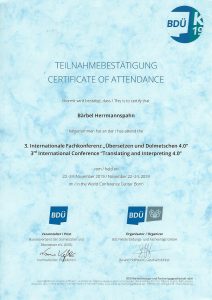


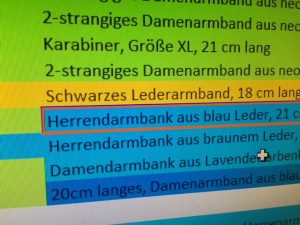
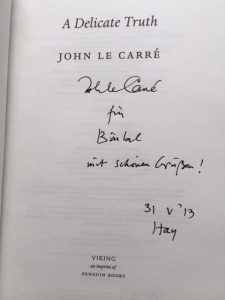

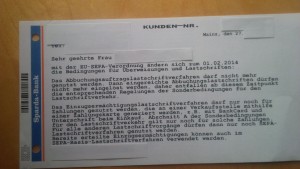
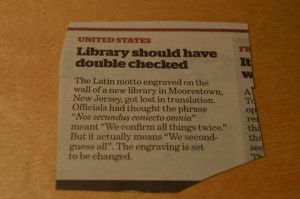
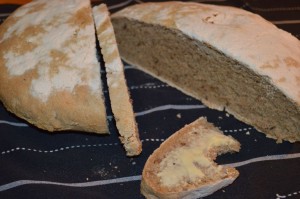
 Bärbel Herrmannspahn is a qualified member of the ITI
Bärbel Herrmannspahn is a qualified member of the ITI
